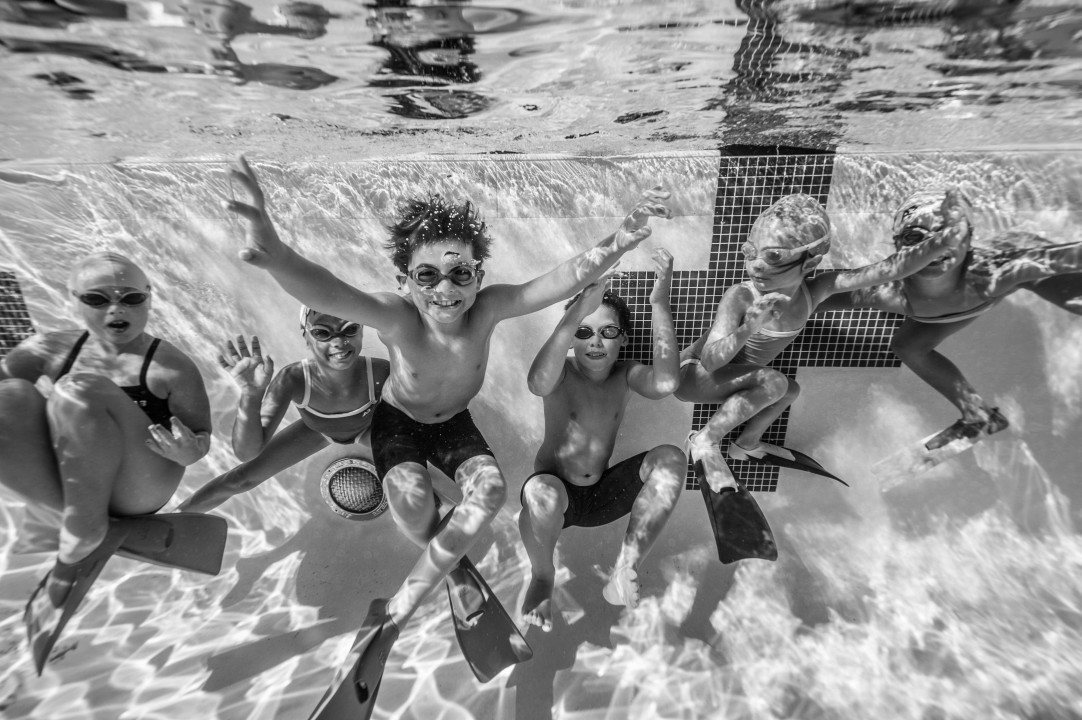This post originally appeared and SwimSpray.com.
For student swimmers, back-to-school also means heading back to the pool. Here’s five swimming-related chemistry lessons to kick off the back-to-school season.
LESSON #1: IT’S A GAS…
When we use the word “chlorine,” we aren’t really talking about the chemical chlorine. Chlorine is a highly poisonous and reactive gas. Swimming pool “chlorine” is really about “chlorinating agents,” like hypochlorite salts. Chlorinating agents should be viewed as powerful cleaning agents. In fact the “hypochlorite salts” used in many pools are the exact same chemical as bleach. These chemicals are wonderful for killing germs in pools. When these chlorinating agents react with other “stuff” in the pool, irritating molecules are created. So, when swimmers complain about the pool “chlorine,” they are not really bothered by the gas “element” of chlorine, but rather the bi-products of the chlorinating agents that we use to sanitize pools.
LESSON #2 –TO PEE OR NOT TO PEE…?
Ask any swimmer….and if they tell you they haven’t…well then…they are most likely fibbing. But the truth behind the science of peeing in the pool is that pee will react with the chlorinating agents to create some nasty, irritating molecules. Those pesky molecules are called chloramines. Those chlorinamines are the smelly, irritating, and harmful molecules—not chlorine.
LESSON #3: I’M STUCK ON YOU…
The protein molecules that make up your body are exactly the sort of molecules that chlorinating agents like to attack, and here’s why: All proteins (like the keratin in your hair and nails) are made from amino acids or as the word “amino” means– they are nitrogen-containing molecules. Chlorine loves to react with nitrogen-containing groups to make chloramines. ( The names should now make sense: Chlor—Amines are chlorinated amines—chlorinated nitrogen-containing molecules.)In other words—the chlorinating agents chemically stick to your body, especially skin and hair. Once the chlorine reacts with your body, it becomes bonded and you can’t just wash it away like oil or dirt. It behaves more like a tough stain.
LESSON #4: HIT ME WITH YOUR BEST SHOT…SPRAY THAT IS.
Pool chemicals are wonderful for killing germs but they are not something that you want on your body all day long. But, if the chlorinating agents are so hard to wash away, what can you do? There is a simple chemical solution to the chlorine on your body. How can you break the chemical bond between chlorine and your body’s proteins? The answer comes from understanding some chloramine chemistry:
- Chloramines are powerful oxidants.
- Oxidants can be neutralized with anti-oxidants.
- Vitamin C is a safe and useful antioxidant.
- SwimSpray uses this science of Vitamin C to completely neutralize the chlorine bond.
LESSON #5: OKAY…NOW FOR A QUICK TEST–NOT THE PEN AND PAPER KIND….
How do you know if you are carrying around chloramines? Do the Lick Test! This test you can do anywhere and anytime to see if you still have a chlorine bonding situation on your body.
Here’s how the Lick Test works:
- Lick your arm and sniff it.
- Does it smell like a pool? If it does, that’s because you have pool chemicals on your body. (What you do with that information is entirely up to you.)
- Now, spray, wash and rinse with SwimSpray and try the Lick Test again…smell gone? (If you smell the Doritos you ate at lunch…well, we can’t help you there).
Try the lick test and let us know if you pass or failed on our Facebook page.
About SwimSpray
SwimSpray was invented by Dr. Andrew Chadeayne, a former Princeton University swimmer and chemistry Ph.D. from Cornell University. Tired of smelling like chlorine after his swimming workouts, Andrew set out remove chlorine from hair and skin ( SwimSpray works where so many other chlorine removal products (e.g., swimmers’ shampoos) have failed previously because SwimSpray’s all-natural vitamin C based formula breaks this bond, neutralizing the chlorine, and allowing it to be washed away with your favorite soap or shampoo.
Follow SwimSpray on Twitter here.
Like SwimSpray on Facebook here.
Courtesy of SwimSpray, a SwimSwam partner.

